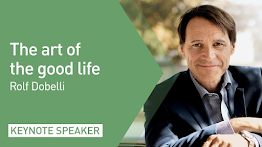The second cognitive bias is known as the intentional stance, a term coined by the American philosopher Daniel Dennett. Under the intentional stance we assume an intention behind every change - regardless of whether or not it was actually intentional. So when the Iron Curtain fell in 1989, it was because somebody had deliberately brought about its collapse. The end of apartheid in South Africa would not have been possible without a campaigner like Nelson Mandela. India needed Gandhi to gain independence. Smartphones needed Steve Jobs. Without Oppenheimer, no atomic bomb. Without Einstein, no relativity theory. Without Benz, no cars. Without Tim Berners-Lee, no World Wide Web. Behind every global development we posit a human being willing it into existence.
~ Rolf Dobelli, The Art of the Good Life (2017), "The Illusion of Changing the World - Part I," p. 163


No comments:
Post a Comment